四年级下英语教学设计-Unit 1 Our school-人教(PEP,无答案)【小学学科网】
四年级-英语人教版PEP下册Unit1-单元教学分析
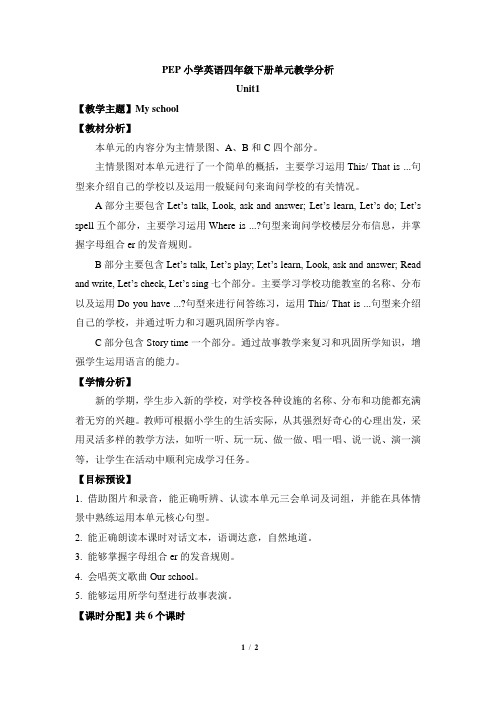
PEP小学英语四年级下册单元教学分析Unit1【教学主题】My school【教材分析】本单元的内容分为主情景图、A、B和C四个部分。
主情景图对本单元进行了一个简单的概括,主要学习运用This/ That is ...句型来介绍自己的学校以及运用一般疑问句来询问学校的有关情况。
A部分主要包含Let’s talk, Look, ask and answer; Let’s learn, Let’s do; Let’s spell五个部分,主要学习运用Where is ...?句型来询问学校楼层分布信息,并掌握字母组合er的发音规则。
B部分主要包含Let’s talk, Let’s play; Let’s learn, Look, ask and answer; Read and write, Let’s check, Let’s sing七个部分。
主要学习学校功能教室的名称、分布以及运用Do you have ...?句型来进行问答练习,运用This/ That is ...句型来介绍自己的学校,并通过听力和习题巩固所学内容。
C部分包含Story time一个部分。
通过故事教学来复习和巩固所学知识,增强学生运用语言的能力。
【学情分析】新的学期,学生步入新的学校,对学校各种设施的名称、分布和功能都充满着无穷的兴趣。
教师可根据小学生的生活实际,从其强烈好奇心的心理出发,采用灵活多样的教学方法,如听一听、玩一玩、做一做、唱一唱、说一说、演一演等,让学生在活动中顺利完成学习任务。
【目标预设】1. 借助图片和录音,能正确听辨、认读本单元三会单词及词组,并能在具体情景中熟练运用本单元核心句型。
2. 能正确朗读本课时对话文本,语调达意,自然地道。
3. 能够掌握字母组合er的发音规则。
4. 会唱英文歌曲Our school。
5. 能够运用所学句型进行故事表演。
【课时分配】共6个课时1/ 2第一课时Part A Let’s talk Look, ask and answer 第二课时Part A Let’s learn Let’s do第三课时Part A Let’s spell第四课时Part B Let’s talk Let’s play第五课时Part B Let’s learn Look, ask and answer 第六课时Part B Read and write Let’s check Let’s sing Part C Story time2/ 2。
PEP小学英语四年级下册Unit1OurSchool作业设计

PEP小学英语四年级下册Unit1OurSchool作业设计In designing English homework。
it is XXX' learning abilities。
interests。
XXX。
for Unit 1 Our School in PEP Primary English Grade 4.I adopted a student-choice homework approach。
which is designed in three levels: A。
B。
and C。
according to the XXX their own level of development.XXX recording。
reading words。
and reading "Let's do" inthe text。
These tasks focus on the mastery of basic knowledge.Level B tasks include drawing and introducing one's own school using simple sentences。
performing dialogues in groups of three using the learned sentence patterns。
and creating dialogues based on the text。
These tasks aim to XXX skills.XXX n of learned knowledge。
They include reading the text。
copying the words and sentences。
drawing a teacher and writingfour words next to it。
and creating dialogues in pairs based on the drawing.The student-choice XXX homework mode。
四年级下册英语教案-Unit 1 Our school subjects 课时3 Cartoon t

四年级下册英语教案-Unit 1 Our school subjects 课时3 Cartoon time & Sound time 译林版(三起)教学目标1.学生能够听懂并理解本课的对话。
2.学生能够自主学习课内单词和句子。
3.学生能够口头表达自己感兴趣的科目。
教学重点1.听懂本课的对话。
2.理解课内单词和句子。
教学难点学生能够口头表达自己感兴趣的科目。
教学准备1.PPT2.讲师笔记3.单词卡片教学过程一、课前导入为引起学生学习兴趣,可以从以下几个方面进行导入。
1.引导学生回忆上一课的内容,学生可以说出上一课有关学校科目的单词和句子。
2.通过一段轻松有趣的视频或音频,或是一篇有趣的短文,让学生感受到学习英语的趣味性。
3.提问学生,询问学生的学习经验和感受,引导学生积极参与到课堂中来。
二、新课讲解1.用PPT展示本课的主要内容。
2.通过图片或实物等方式,向学生展示本课的主要单词和句子,使学生能够直观地了解这些单词和句子的含义。
3.向学生介绍有关本课的文化知识,例如有关卡通和声音的相关知识。
4.指导学生精听并理解本课的对话,直到学生能够独立理解日常对话。
三、破冰活动1.设计一项小游戏,目的在于让学生通过游戏,放松身心,同时对本节课的内容进行了解和深入理解。
2.学生可以利用游戏时间,更好地了解本节课的单词和句子。
四、学习核心内容本部分的重点在于学生独立学习本节课的单词和句子,并且能够将学到的知识运用到实践中。
Part 1 Cartoon time1.学生可以观看一些简短的卡通视频,目的是让学生了解和熟悉这些卡通角色。
2.学生可以通过观看卡通视频,了解一些英语单词和句子,可以在学习过程中记录下来。
Part 2 Sound time1.学生可以听到一些常见声音,如车声,闹钟声等。
2.学生可以学习有关声音的单词和句子,例如。
小学英语PEP人教版四年级下册《Our School》word版教案

UNIT 1 Our School 第一课时教案一、教学内容A部分 Let’s learn Let’s do二、教学目标1.能够听、说、认读本课时的主要单词:teacher's office, canteen, garden, playground, library。
2.听懂指示语,并按要求做出相应的动作,如:Go to the garden.Water the flowers.三、教学重、难点1.本课时需要重点掌握有关学校设施的五个单词并了解它们的功能。
2.本课时的难点是library中辅音连缀的发音。
四、教学准备1.教师准备一幅本单元的校园分布图。
2.教师准备本课时的五张单词卡。
3.教师准备录音机及录音带。
4.学生准备一张白纸和笔。
五、教学资源中央网台六、教学方法1.热身(Warm-up)教师播放四年级上册学生用书第五页的歌谣“Work And Play”,让学生跟随录音说唱。
2.预习(Preview)通过和学生一起回顾四年级上册学生用书第一单元句型:“What's in the classroom? A board, two lights, many desks and chairs.”自然过度到学习学校各课室的名称。
3.新课呈现(Presentation)Let's learn(1)教师指着教室问学生:This is our new classroom.Do you like our classroom? What's in the classroom? 学生做出相应的回答。
教师接着问:How many classrooms are there in our school? Do you like our school? What else can you see in the school? Look! This is a map of our school.接下来教师借助校园分布图教授生词。
Unit1 My school(说课稿) 人教PEP版英语四年级下册
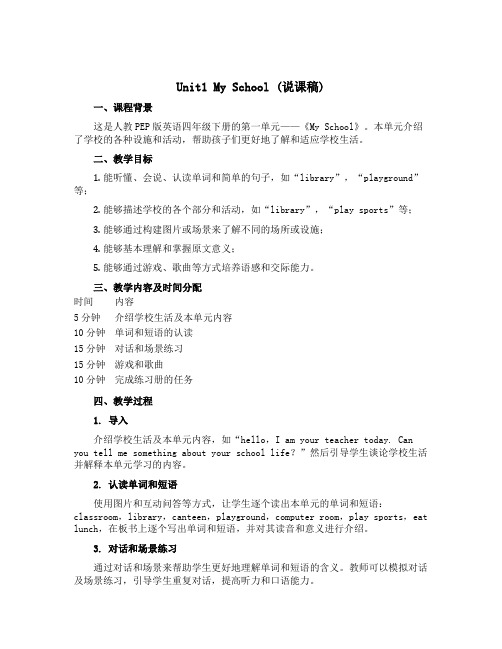
Unit1 My School (说课稿)一、课程背景这是人教PEP版英语四年级下册的第一单元——《My School》。
本单元介绍了学校的各种设施和活动,帮助孩子们更好地了解和适应学校生活。
二、教学目标1.能听懂、会说、认读单词和简单的句子,如“library”,“playground”等;2.能够描述学校的各个部分和活动,如“library”,“play sports”等;3.能够通过构建图片或场景来了解不同的场所或设施;4.能够基本理解和掌握原文意义;5.能够通过游戏、歌曲等方式培养语感和交际能力。
三、教学内容及时间分配时间内容5分钟介绍学校生活及本单元内容10分钟单词和短语的认读15分钟对话和场景练习15分钟游戏和歌曲10分钟完成练习册的任务四、教学过程1. 导入介绍学校生活及本单元内容,如“hello,I am your teacher today. Can you tell me something about your school life?”然后引导学生谈论学校生活并解释本单元学习的内容。
2. 认读单词和短语使用图片和互动问答等方式,让学生逐个读出本单元的单词和短语:classroom,library,canteen,playground,computer room,play sports,eat lunch,在板书上逐个写出单词和短语,并对其读音和意义进行介绍。
3. 对话和场景练习通过对话和场景来帮助学生更好地理解单词和短语的含义。
教师可以模拟对话及场景练习,引导学生重复对话,提高听力和口语能力。
示范对话:•T: Where can you borrow books?•S: In the library.•T: What can you do on the playground?•S: We can play sports.示范场景:教师使用场景练习,如在操场、教室、图书馆、食堂等地方,让学生模拟说出相关的单词和短语。
译林版四年级下册英语教案:Unit 1 Our school subjects 第一课时
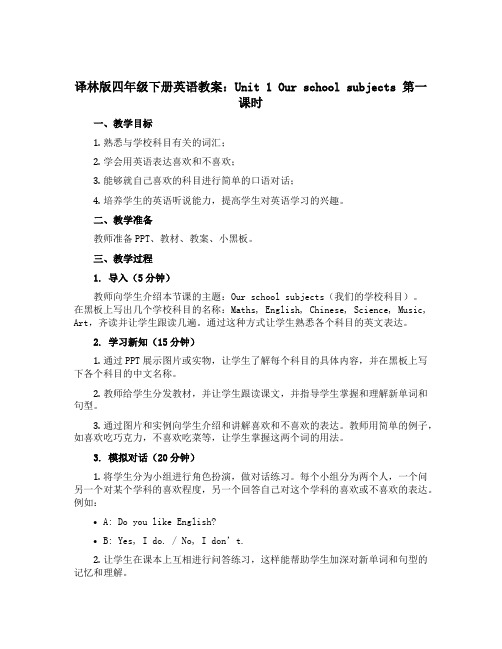
译林版四年级下册英语教案:Unit 1 Our school subjects 第一课时一、教学目标1.熟悉与学校科目有关的词汇;2.学会用英语表达喜欢和不喜欢;3.能够就自己喜欢的科目进行简单的口语对话;4.培养学生的英语听说能力,提高学生对英语学习的兴趣。
二、教学准备教师准备PPT、教材、教案、小黑板。
三、教学过程1. 导入(5分钟)教师向学生介绍本节课的主题:Our school subjects(我们的学校科目)。
在黑板上写出几个学校科目的名称:Maths, English, Chinese, Science, Music, Art,齐读并让学生跟读几遍。
通过这种方式让学生熟悉各个科目的英文表达。
2. 学习新知(15分钟)1.通过PPT展示图片或实物,让学生了解每个科目的具体内容,并在黑板上写下各个科目的中文名称。
2.教师给学生分发教材,并让学生跟读课文,并指导学生掌握和理解新单词和句型。
3.通过图片和实例向学生介绍和讲解喜欢和不喜欢的表达。
教师用简单的例子,如喜欢吃巧克力,不喜欢吃菜等,让学生掌握这两个词的用法。
3. 模拟对话(20分钟)1.将学生分为小组进行角色扮演,做对话练习。
每个小组分为两个人,一个问另一个对某个学科的喜欢程度,另一个回答自己对这个学科的喜欢或不喜欢的表达。
例如:•A: Do you like English?•B: Yes, I do. / No, I don’t.2.让学生在课本上互相进行问答练习,这样能帮助学生加深对新单词和句型的记忆和理解。
3.班级集体模拟对话,让学生口头表达自己的观点,进一步提高学生对英语口语的自信心和流利度。
4. 练习与评价 (15分钟)1.通过图片比对或其他形式的练习,帮助学生巩固所学内容。
2.设计一些简单的练习题,以检验学生对所学内容的掌握情况。
例如,可以问学生:“What’s your favourite subject?(你最喜欢什么科目?)”5. 作业布置(5分钟)布置本节课的作业,让学生练习各种句型,熟悉本节课的新单词,并在家完成课本上的小练习。
人教版小学四年级下册英语教学设计(全册)

人教版小学四年级下册英语教学设计(全册)1、教材结构分析本学期使用教材是《九年义务教育六年制小学教科书英语(第四册)》(PEP PRIMARY ENGLISH STUDENTS’BOOK 4),本册教材分为六个单元,两个复习单元。
2、教学内容分析3、教学重难点分析进行简单的交流关于学校、时间、衣服、天气、购物、农场动物、数字、颜色等几个话题,能用英语书写句子。
一、教学目标1、知识技能目标能听懂、会说12组会话,并能进行简单的交流;能听、说、认读60个单词和词组并能听、说、读、写61个单词和24个句子。
2、操作应用目标能用英语进行关于学校、时间、衣服、天气、购物、农场动物、数字、颜色等几个话题的讨论,并简单运用。
3、情感态度价值观目标强调语言的运用,注重能力的培养,突出了兴趣的激发,重视双向交流,融合学科内容,重视灵活扩展,实现整体设计。
二、班级学生情况分析(包括基本情况、认知基础、情感态度、学习习惯以及活动、操作技能、后进生名单等)四年级分两个班,一班人,二班人,两班情况基本相同,后进生比较多,再加上新转来的几个同学,原来根本没有英语基础,这学期不但要掌握教材所学知识,还要转化后进生,所以在教学中要特别注意改进教学方法,提高课堂效率,争取使每个学生在原有的基础上都有所进步。
三、主要教学措施(除针对全班学生的教学措施外,还包括后进生辅导、转化措施等)1、融会话教学与情景表演之中2、巧用实物、头饰、卡片、chant 等来帮助进行单词教学。
3、利用读写课等时间对学生进行单词书写的指导四、教学进度安排教学进度表第一单元教学计划一、单元教学内容分析Unit 1 My school1、单元教学内容:本单元重点学习学校科室及功能室的名称、分布和不同的功能。
要求学生能够听说认读这些课室的单词,说出每个科室的不同功用,并简单介绍学校校舍的分布情况。
重点学习的句型是:This is …….. That is ………. Is this …….? .Is that …….? Yes,it is ./No, it isn’t.同时渗透了序数词的运用以及字母组合er在单词中的最基本的发音。
人教版PEP四年级下册英语第一单元教学设计

Unit1 My school教学设计单元概述:本单元讲述的是有关学校校舍建设的话题,学习句型Where is the teachers’ office?来Do you have a library(gym, playground)?询问学校校舍的分布情况以及他人校舍的分布情况。
本单元分为Part A , Part B, Part C三部分,前两部分为学习重点。
Part C是扩展性的趣味语言教学内容。
单元内容既巩固了上学期所学的教室内物品的分布情况,又衔接了学校校舍分布及各个课室不同的功能,使英语学习更具趣味性。
因此,这一单元不仅有上册知识的复习,又有新知识的衔接,重难点突出,第一单元话题是学生较为熟悉的校舍,第一单元的学习尤为重要。
设计理念:学生新年后返校,积极性高,对英语学科的学习也充满了好奇。
四年级学生对英语学习也有了一定了解并有一定基础的语言功底。
本学期的会话教学我更应大胆、创新,采取表演、游戏、学生讲评等方式来学习新语言知识。
词汇教学,我仍坚持采用肢体语言、自制单词卡片、简笔画想结合的方式加强学生记忆,巩固练习所学词汇。
教学内容:1.主要学习句型:Where’s the teachers’ office? It’s on the second floor. Do you have a library? Y es,I/we do.2.学习新单词、词汇:teachers’ office, playground, library, computer, computer, art room, secondfloorfirst floor, next to, homework, forty.3.学习新句型:Is that…?It’s on the second floor.4.学习字母组合er的发音,在单词中的位置及正确书写单词。
教学重点:1.句型:Where’s the teachers’ office? It’s on the second floor. Do you have a library? Y es, I/we do.在情景中的正确使用。
新版PEP四年级英语下册Unit1-My-school教案及反思

PEP小学英语四年级下册教案Unit 1 My SchoolA Let’s learn(词汇课)一、教学内容本课主要包括A部分的Let′s learn.同时兼顾Let′s do部分。
这节课主要是学习描述设施及活动场所的单词,同时会询问或描述学校某设施、场所的大体位置。
二、教学目标根据教材的基本特点以及教学内容,将教学目标确定为:1.知识与技能目标:①能够听、说、认读本课时的主要单词:playground, garden, teacher’s office, library, canteen.②能运用句型“Where is the…? It′s on the…floor.”来询问或描述学校某设施、场所的大体位置.③听懂Let′s do的指示语,并按指令做出相应的动作,来巩固复习Let′s learn部分词汇.2.过程方法目标:通过播放课本12页的英文歌曲“Our school”,自然引入到“ School”这一话题,既活跃了课堂气氛,又促进学生对本节课新知识的学习;通过展示我们熟悉的校园图片,来教授新单词,更直观、形象,易于理解;通过联系生活实际,让学生说说如何做到文明就餐和在图书馆阅读,有利于孩子养成良好生活、学习习惯。
通过看图连单词,既起到了复习目的又锻炼了学生敏锐的观察力;通过会话练习,与同桌合作介绍学校,将所学的语言运用到真实的情景中,培养学生合作能力和综合运用语言的能力。
最后再次播放歌曲,既突出了本课主题,又有利于培养孩子热爱自己学校的美好情感。
3.情感态度与学习策略:通过本节课的学习,让学生简单了解学校设施、场所大体功能,培养他们用英语表达的兴趣和热爱学校的美好情感。
通过活动和练习,加强师生之间、生生之间互动交流,培养学生与人相处、交往能力、合作能力以及养成良好的学习习惯。
三、学情分析:小学四年级学生,通过上册第一单元My classroom学习,他们已经掌握了一些简单与学校设施相关的词汇如: classroom,computer, teacher’s desk 等,能够用所学的知识对学校熟悉的事物进行简单描述,为新课学习奠定了基础,并且他们学习英语兴趣浓厚,模仿力强,好奇心强,善于表现自己,因而我注重以学生为主体,激发学生的学习兴趣,引导学生积极参与,注重学生的感知能力培养。
四年级下册英语教案-Unit 1 Our school subjects 课时5 Exercise

四年级下册英语教案-Unit 1 Our school subjects 课时5Exercise 译林版(三起)教学目标1.学生能够听、说、读、写本单元的词汇和句型。
2.学生能够准确理解和运用目标语言进行交流。
3.学生能够通过教学活动增强学习英语的乐趣和兴趣。
教学重点1.学生能准确读和说本单元重点单词和重点句型。
2.学生能熟练运用所学内容进行日常交际,增强语言交际能力。
教学难点1.学生能根据所学内容自主创新内容,用英语进行交际。
2.学生能够根据教师指导,理解课文中涉及到的文化背景和生活习惯,持续学习和了解英语国家的文化和习惯。
教学内容本课时我们将学习本单元的Exercise部分,包括以下内容:1.学习和运用班级感想和评价语句,进行交际练习。
2.学习和理解课文中涉及到的文化背景和生活习惯,用英语进行交际练习。
3.学习和运用英语书信的规范格式。
教学过程1. Warm-up1.教师与学生打招呼,讨论今天的主题是什么。
通过师生交流进行热身,培养英语听说能力。
2. Presentation1.通过教师和学生的交流,引导学生理解和记忆本单元词汇和句型,并熟练运用。
2.通过游戏和互动的方式,帮助学生巩固所学内容,提升英语交际能力。
3. Practice1.分组讨论本单元中班级感想和评价语句的运用方法,并进行角色扮演。
2.通过学生的交流和互动,激发学生对班级手记和英语书信的兴趣,提高学习热情和学习效果。
4. Extension1.引导学生自主创新内容,并用英语进行交际。
2.通过分享学生的创新内容,让学生感受到英语学习的快乐和成就感。
3.通过阅读和翻译英语书信,让学生理解和掌握英语书信的规范格式。
总结1.回顾本课所学内容,巩固学习效果。
2.提醒学生在日常生活中用英语进行交际,加强语言交际能力。
附教学用具:学生作业本、教师投影仪教学环境:宽敞清新的教室上课时间:60分钟课后作业1.让学生自主练习所学内容,巩固学习效果。
小学英语PEP四年级下册Unit-1-our-school-教案

Unit 1 Our School单元(dānyuán)分析:本单元(dānyuán)的话题是学校(xuéxiào),是学生在日常生活中常见又喜欢的话题,学生通过这一单元的学习,能够(nénggòu)简单描述。
本单元(dānyuán)重点学习有关学校的设备和科室及其活动等,其中难点在于A部分的Let’s talk 和B部分的Let’s learn。
在教学中教师应尽量采用情景、实物教学的方式讲授并注意分解难点。
注意This is ….和That is …的比较教学,即用前者带动后者,同时复习惯以家庭的房间的介绍。
第一课时教学内容:Part A Let’s learn. Let’s do ./ Part C Good to know.教学目标:1.学生能够3.5会掌握本课4个新词teacher’s office canteen garden playground2.学生能够3.5会掌握并初步能运用句子This is the teacher’s office. That is my room. Where is the canteen? It’s on the first floor.来介绍学校的科室。
3.能够听懂、会说并初步运用本课重点句型This is the teacher’s office. That is my room.4 理解Let’s do .内容教学重点:本课时的教学重点是掌握teacher’s office canteen garden playground四个单词,并能在情景中运用This is the teacher’s office. That is my room. Where is the canteen? It’s on the first floor.来介绍学校的科室。
教学难点:单词expensive的发音及运用所学句型正确评价衣物。
人教PEP版四年级下册英语Unit1单元整体设计第1课时
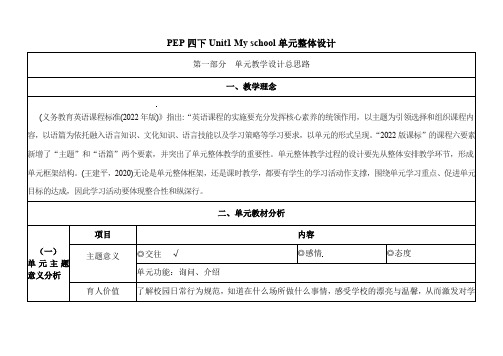
(3)引导学生热情接待来访者,并热情向他人介绍自己的学校,培养学生以学校为荣、热爱学校的美好情感。
1.3.Role-play
4.Let’s do
Where’s the library?
通过对话练习的方式,既可以巩固知识点,又可以发散学生的思维
8.Homework
(1)认真朗读并背诵单词及句子。
分层作业,自主拓展,有利于学生的语言表达和写作能力的发展。
五、板书设计
[How]文本结构和语言修辞
本课时通过单元大任务:介绍自己的学校开启的活动一:介绍学校场室及其功能,要求学生能用英文介绍学校场室,了解不同场室的功能,学会遵守相应的行为规范,热爱自己的学校。。
二、教学重难点
教学重点
1.学生能够听、说、认读单词或词组:library, teachers’office, first floor, second floor, computer room, art room, music room, playground, gym。并运用核心词组和句型描述学校的场室。
(2)熟练运用句型“Where’s the library? It’s on the first floor.询问、描述学校教室和场馆的位置。
(3)了解英国和美国对first floor和second floor的不同表述方法。
(4)感受到学校的漂亮与温馨,从而激发对学校的热爱。
(5)了解日常行为规范,知道在什么场所做什么事情。
教学难点
人教PEP版英语四年级下册第一单元【教案】

Unit 1 My school一、单元整体分析本单元是人教版英语四年级下册的第一单元,单元话题是“My school.”本单元重点学习学校、校舍;场馆的名称及相应的位置。
共三个版块:A 部分,B部分和C 部分。
A、B部分呈现新知识点,C部分是以讲故事形式巩固或延展知识面。
共分六课时来学习。
本单元A,B部分的Let’s learn 主要学习学校功能教室的名称。
Let’s talk. 以对话的方式引出重点句型。
read and write 部分呈现了本单元的四会单词及句型,从中学会了正确的书写格式。
Let’s spell 部分,要求学生通过听音、跟读,理解字母组合“er”的正确发音。
此外Look,ask and answer,Let’s do,Let’s play,Let’s sing,Let’s check 和C部分的story time 则是通过多种多样的活动,与School 串联起来,让学生们在轻松愉快的情景中习得语言,运用语言。
在课堂教学中,首先要整体把握本单元教学内容、教学重点和教学难点,了解学生学情。
然后围绕本单元主题“My school”展开教学设计。
本单元的教学内容和学生相关,在组织语言教学时要注意设计生活化,充分利用教材已经设定的情境开展活动,帮助学生在合作学习中和任务型学习中正确表达所学句型。
鼓励学生自编歌谣巩固所学知识。
本单元所需要掌握的询问功能室的位置的句型“Where’s the …? It’s on the ….”在前面的教材中没有集中涉及,但是对于疑问代词“Where”同学们并不陌生。
询问某人来自哪里的句型“Where are you from?”在三年级下册教材中已经学过。
这个句型的表达对本单元的教学有一定的帮助。
二、单元教学目标1. 知识目标(1)能听、说、读三会单词teachers’ office;library;playground;computer room;art room;music room ;first floor;second floor。
人教版pep四年级下册英语单元教学设计
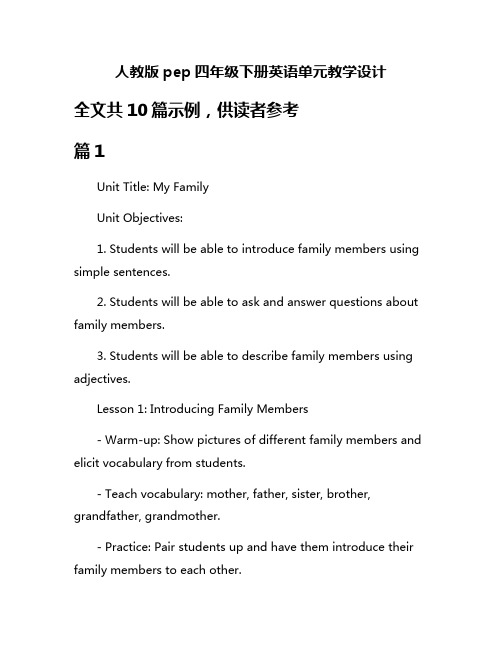
人教版pep四年级下册英语单元教学设计全文共10篇示例,供读者参考篇1Unit Title: My FamilyUnit Objectives:1. Students will be able to introduce family members using simple sentences.2. Students will be able to ask and answer questions about family members.3. Students will be able to describe family members using adjectives.Lesson 1: Introducing Family Members- Warm-up: Show pictures of different family members and elicit vocabulary from students.- Teach vocabulary: mother, father, sister, brother, grandfather, grandmother.- Practice: Pair students up and have them introduce their family members to each other.- Activity: Students create a family tree on a piece of paper and color code each family member.Lesson 2: Asking and Answering Questions- Review vocabulary from previous lesson.- Teach question words: Who, Where.- Practice: Have students ask and answer questions about family members in pairs.- Activity: Students create a mini-dialogue where they ask and answer questions about their family members.Lesson 3: Describing Family Members- Teach adjectives to describe family members: tall, short, young, old, kind, funny.- Practice: Students describe their family members using the adjectives learned.- Activity: Students create a poster with pictures of their family members and write adjectives to describe them.Assessment:- Students will be assessed through oral participation, written assignments, and a final project where they present their family tree and describe their family members using adjectives.Overall, this unit is designed to help students talk about their family members confidently and accurately. It aims to improve their speaking and listening skills while also expanding their vocabulary and grammar knowledge.篇2Unit 1 My SchoolHello everyone! Today we are going to talk about our school. In this unit, we will learn about different places in our school, like the classroom, playground, library, and more. We will also learn how to talk about our school supplies and the things we do in school.First, we will learn about the classroom. We will learn how to say "This is my classroom" and "This is my desk". We will also learn about the things we can find in the classroom, like books, pencils, and rulers.Next, we will talk about the playground. We will learn how to say "I like playing on the playground" and "I like swings andslides". We will also learn about the things we can do on the playground, like running, jumping, and playing with our friends.After that, we will learn about the library. We will learn how to say "This is the library" and "I like reading books". We will also learn about the different kinds of books we can find in the library, like storybooks, picture books, and encyclopedias.In this unit, we will also learn about our school supplies. We will learn how to say "I have a pencil case" and "I need a notebook". We will also learn about the different colors, shapes, and sizes of our school supplies.Finally, we will learn about the things we do in school. We will learn how to say "I listen to the teacher" and "I write in my notebook". We will also learn about the different subjects we study in school, like English, math, and science.I hope you are excited to learn more about our school in this unit. Let's have fun together and become smart students! Bye bye!篇3Unit Title: My Daily RoutineHi everyone! My name is Lucy and I'm going to teach you all about my daily routine in this unit. Are you ready to learn? Let's get started!1. Warm-up:To start our lesson, we will begin with a fun song called "The Daily Routine Song". This song will help us learn the words for different daily activities such as brushing teeth, eating breakfast, and going to school. Let's sing along and dance to the music!2. Introduction:Next, I will introduce the key vocabulary words for this unit. We will learn words like "wake up, wash face, get dressed, have breakfast, go to school, do homework, and go to bed". I will show you pictures of each activity and we will practice saying the words together.3. Practice:After learning the vocabulary, we will move on to practicing the daily routine actions. I will ask each of you to describe your own daily routine using the words we have learned. For example, "I wake up at 7 o'clock, brush my teeth, have breakfast, go to school, do homework, and go to bed at 9 o'clock".4. Games and Activities:To make our lesson more fun, we will play games like "Simon Says" where I will give instructions for different actions and you have to do them. We will also do group activities like drawing a picture of your daily routine and presenting it to the class.5. Review and Assessment:At the end of the unit, we will review all the vocabulary words and actions we have learned. I will give you a small quiz to test your knowledge and understanding of the daily routine. Don't worry, it will be fun and easy!I hope you all enjoy learning about my daily routine in this unit. Remember to practice your English every day and you will become fluent in no time! Have a great day!篇4Title: My English Lesson Plan for Grade 4 UnitHey there, my little buddies! Today I'm gonna share with you my super duper awesome English lesson plan for the Grade 4 Unit in the People's Education Press (PEP) textbook. Are you ready? Let's dive right in!First up, we're gonna start with the new vocabulary words for the unit. We'll learn about different topics like colors, animals,food, and daily routines. We'll play games, sing songs, and do fun activities to help us remember the words better.Next, we'll move on to grammar. We'll learn how to make sentences using the new vocabulary words. We'll practice speaking and listening skills by asking and answering questions, describing pictures, and role-playing different scenarios.After that, we'll focus on reading and writing. We'll read short stories, poems, and dialogues to improve our reading comprehension. We'll also practice writing sentences, paragraphs, and even short essays to enhance our writing skills.To make the learning process more engaging and interactive, we'll incorporate multimedia resources like videos, audio clips, and online games. We'll also work in pairs or small groups to encourage collaboration and peer learning.Finally, we'll review all the topics we've covered in the unit through quizzes, games, and presentations. We'll celebrate our achievements together and look forward to the next unit with excitement and enthusiasm.And there you have it, my little friends! That's my English lesson plan for the Grade 4 Unit in the PEP textbook. I hopeyou're as excited as I am to start learning and exploring thewonderful world of English together. Let's have a blast in our English class! See you next time! Bye-bye!篇5Hello everyone! Today I'm going to share with you my English teaching plan for the fourth grade unit in the People's Education Press (PEP) textbook.First, let's start with the objectives of this unit. The main goal is to help students improve their listening, speaking, reading, and writing skills in English. This unit will focus on vocabulary related to daily activities, such as getting up, brushing teeth, having breakfast, going to school, and playing with friends.To achieve these objectives, I have divided the unit into several parts. In the first lesson, we will introduce the new vocabulary through flashcards and pictures. We will practice pronunciation and spelling, and students will have the opportunity to ask questions and make sentences using the new words.In the following lessons, we will work on listening comprehension by playing audio recordings of short conversations and asking students to answer questions about them. We will also practice speaking by role-playing differentscenarios related to daily activities. Additionally, we will work on reading comprehension by reading short passages and answering questions about them.Finally, in the last lesson of the unit, we will focus on writing. Students will be asked to write a short paragraph describing their daily routine. They will have the chance to practice writing sentences using the vocabulary they have learned in previous lessons.Overall, this unit is designed to be interactive and engaging, with plenty of opportunities for students to practice their English language skills. I am confident that by the end of the unit, students will have a better understanding of daily activities and be able to communicate more effectively in English. Thank you for listening, and I hope you enjoy this English teaching plan!篇6Unit Title: Animals1. Topic Introduction:Hello friends! Today we are going to learn all about animals! Animals are living things that can move, eat, and breathe. There are many different types of animals in the world, such as lions,elephants, cats, dogs, birds, and fish. Let's explore more about animals in this fun unit!2. Learning Objectives:- Students will be able to identify different animals and their characteristics.- Students will be able to describe animals using simple adjectives.- Students will be able to talk about their favorite animals.3. Vocabulary:- Animals: lion, elephant, cat, dog, bird, fish- Adjectives: big, small, fast, slow, cute, colorful4. Lesson Plans:- Lesson 1: Introduction to Animals- Show pictures of different animals and ask students to identify them.- Introduce new vocabulary words and have students repeat after you.- Play a game where students have to match the animal with its name.- Lesson 2: Animal Characteristics- Teach students different characteristics of animals (e.g. lions are big and fierce, birds are small and can fly).- Have students draw their favorite animals and describe them using adjectives.- Lesson 3: My Favorite Animal- Have students talk about their favorite animals in front of the class.- Encourage students to use the vocabulary words and adjectives they have learned.5. Activities:- Animal Bingo: Create a bingo game with pictures of animals. Students have to match the animal with its name.- Animal Role Play: Divide students into groups and have them act out different animals. Other students have to guess which animal they are.6. Assessment:- Have students take a short quiz where they have to identify different animals and describe them using adjectives.- Evaluate students based on their participation in class activities and their ability to talk about animals.7. Conclusion:We have learned so much about animals in this unit! Remember, animals are our friends and we should always be kind to them. Keep exploring and learning about the wonderful creatures that share our planet!篇7Unit 1 ToysHell o everyone! Today I’m gonna tell you about our English class in Unit 1: Toys. It's super fun and exciting!First, we start with the warm-up. Our teacher plays a game with us to review the toys we learned in the last unit. We have to guess the name of the toy she describes. It's so much fun and gets our brains working!Next, we learn new words about toys. Our teacher shows us pictures of different toys like a teddy bear, a doll, and a robot. We have to say the words out loud and repeat after her. She also teaches us how to say “I like…” and tell our friends which toys we like the most.After that, we do some activities to practice the new words. We play a matching game where we have to match the toy with its name. We also do a listening activity where our teacher says a word and we have to point to the correct toy.Finally, we end the class with a fun song about toys. We dance and sing along with the music. It’s the best part of the class!I love learning English about toys. It’s so cool to talk about all the fun things we play with. Can’t wait for the next class! That’s all for Unit 1: Toys. Thanks for reading! Bye bye!篇8Title: Unit Design for the Fourth Grade English Textbook of People's Education PressHello everyone! I'm a fourth-grade student, and today I'm going to tell you about the awesome English unit design that my teacher came up with for our class. We are using the People's Education Press textbook, and it's super fun!Unit Theme: My Daily RoutineIn this unit, we will learn all about our daily routines. We will talk about what we do in the morning, afternoon, and evening.We will also learn about different activities and how to talk about them in English.Unit Objectives:1. Learn vocabulary related to daily routines such as 'brush my teeth', 'have breakfast', 'go to school', etc.2. Practice using simple present tense to talk about daily activities.3. Develop listening and speaking skills through group activities and role play.4. Gain an understanding of time markers such as 'in the morning', 'in the afternoon', 'at night', etc.5. Apply learned vocabulary and grammar structures in writing activities.Unit Activities:1. Vocabulary Games: We will play games like Bingo and Memory Match to learn and review new vocabulary words.2. Role Play: We will act out different daily routines and practice speaking in English.3. Listening Comprehension: We will listen to short dialogues and answer questions about them.4. Writing Practice: We will write about our own daily routines and share them with the class.5. Song and Dance: We will learn a fun English song about daily routines and create our own dance moves to go with it.Assessment:Our teacher will assess our learning through quizzes, speaking exercises, and writing assignments. We will also have a final project where we create a poster showing our daily routines using English.I'm so excited to start this unit! Learning English is so much fun when we do it together as a class. I can't wait to show off my English skills to my friends and family. Thank you for reading about our awesome unit design! Bye bye!篇9Unit Title: My FamilyLesson 1: Family MembersObjective: Students will be able to identify and talk about family members in English.1. Warm-up (5 minutes): Open with a song about family members to get students excited and engaged.2. Introduction (10 minutes):- Show pictures of different family members and teach the vocabulary (mother, father, sister, brother, grandmother, grandfather).- Practice pronunciation and drilling of the words with the students.3. Activity 1: My Family Tree (15 minutes):- Give each student a template of a family tree and have them draw their family members on it.- Encourage them to label each family member with the correct English vocabulary.4. Activity 2: Who is Who? (10 minutes):- Show pictures of family members and have students take turns guessing who they are.- Encourage them to say sentences like "She is my mother" or "He is my brother".5. Review (5 minutes):- Go over the vocabulary and have students repeat the words.- Encourage students to ask and answer questions about their family members in English.6. Homework (5 minutes):- Ask students to draw a family portrait and label each family member in English.Lesson 2: My Family ActivitiesObjective: Students will be able to talk about different activities they do with their family members in English.1. Warm-up (5 minutes): Begin with a quick review of the family members vocabulary from the previous lesson.2. Introduction (10 minutes):- Introduce new vocabulary related to family activities (cook, play, read, watch TV) and practice pronunciation with the students.3. Activity 1: Family Activities Matching (15 minutes):- Give each student a set of picture cards showing different family activities.- Have them match the pictures to the correct English words.4. Activity 2: Family Activities Role Play (15 minutes):- Divide students into pairs and have them role play different family activities.- Encourage them to use the new vocabulary in their conversations.5. Review (5 minutes):- Review the vocabulary and ask students to share what activities they like to do with their family members.6. Homework (5 minutes):- Ask students to write a short paragraph about a fun activity they did with their family and share it in the next class.By the end of these two lessons, students should have a good understanding of family members vocabulary and be able to talk about different activities they do with their family inEnglish. The lessons are designed to be interactive and engaging to help students learn and retain the new language skills.篇10Okay! Let's get started with our English lesson plan for the fourth grade class using the People's Education Press (PEP) textbook.Title: Fun and Engaging English Lessons for Fourth GradeIntroduction:Hello, everyone! In today's lesson, we are going to learn all about Unit 1 of the PEP English textbook for fourth grade. This unit is all about animals and nature, so get ready for an exciting learning experience!Warm-up Activity:To start off our lesson, let's play a quick game of "Animal Charades." I will act out different animals, and you have to guess what they are. This will help us review some of the vocabulary words we have learned so far.Main Activity:1. Vocabulary Word Matching: Let's match the animal names with their pictures. For example, match "cat" with the picture of a cat.2. Reading Comprehension: We will read a short passage about different animals and answer questions based on the text.3. Interactive Activity: We will play a game where you have to identify the sounds different animals make. For example, what sound does a duck make?4. Creative Writing: You will write a short paragraph describing your favorite animal and why you like it.Wrap-up:To wrap up our lesson, we will review all the new vocabulary words we have learned today. I will show you flashcards with the words on them, and you have to say the word out loud.Homework:Your homework for tonight is to draw a picture of your favorite animal and write a sentence about it. Don't forget to review all the new vocabulary words we learned today!Conclusion:I hope you all had fun learning about animals and nature today. Remember to practice your English skills every day and have fun while doing it! See you in our next lesson!。
人教PEP版四年级英语下册Unit 1单元教案

人教PEP版四年级英语下册Unit 1单元教案人教PEP版四年级英语下册Unit 1单元教案第一课时教学目标1.能听、说、认读单词和短语teachers’ office, library, first floor, second floor, homework, next to。
2.会运用句型Where is the teachers’ office?It’s on the second floor.Where is the library?It’s next to the art room.介绍学校各个建筑之间的位置关系。
3.培养学生爱护公物、关心集体、乐于助人的良好品质。
教学重点1.掌握单词和短语teachers’ office, library, first, second, on the first/second floor, next to等。
2.掌握句型Where is/are…?It’s/They’re in/on…3.掌握介词in, on, next to 的用法。
教学难点1.掌握介词和序数词在英语句子中的应用。
2.会根据学校各个建筑物之间的位置关系进行对话练习,正确使用介词和序数词。
教学准备教师准备:与本课时相关的录音和课件;本课所学的单词卡片和校园建筑物的图片。
学生准备:本课所需单词卡片和校园建筑物的图片。
教学方法1.情景教学法教师拍摄自己学校的照片,并在图片上用英语标注对应的建筑物,和学生一起根据图片进行对话练习,创设情景,学习和巩固单词。
2.游戏教学法教师利用图片把各个建筑物展示给学生,学生根据教师所指位置关系把对应的图片放在正确的位置,这样,学生在游戏的同时也掌握了介词的用法。
教学过程Step 1: Warm-up1.师生问候,用英语打招呼 Welcome back to school!2.播放歌曲Our school,通过一起唱歌调动学生学习英语的积极性。
3.Main Scene(1)学生看学生用书2,3 页,根据图片猜一猜下列单词和短语的意思:playground, library, next to, art room, teachers’ office, computer room, on the second floor。
PEP人教版小学英语四年级下册全册教案(教学设计)
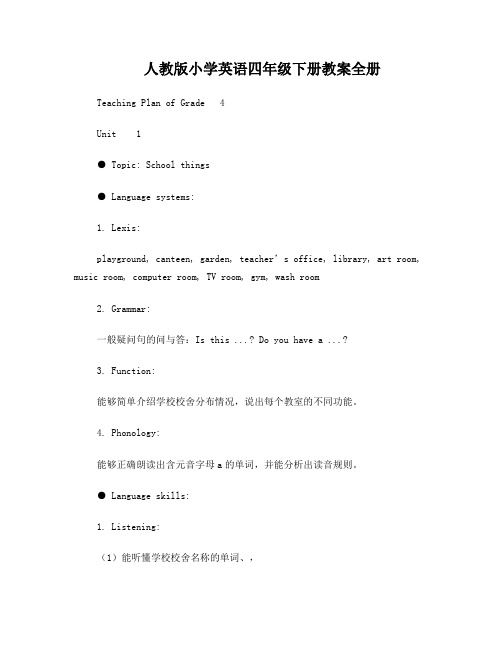
人教版小学英语四年级下册教案全册Teaching Plan of Grade 4Unit 1● Topic: School things● Language systems:1. Lexis:playground, canteen, garden, teacher’s office, library, art room, music room, computer room, TV room, gym, wash room2. Grammar:一般疑问句的问与答:Is this ...? Do you have a ...?3. Function:能够简单介绍学校校舍分布情况,说出每个教室的不同功能。
4. Phonology:能够正确朗读出含元音字母a的单词,并能分析出读音规则。
● Language skills:1. Listening:(1)能听懂学校校舍名称的单词、,(2)能听懂一般疑问句的问与答。
(3)能听懂read and write中的词句,以及Pronunciation中元音字母的发音。
(4)能听懂关于学校规章制度的英语说法。
2. Speaking:(1)会说本单元表示校舍及课室功能名称的单词。
(2)会说会运用本课的句子介绍学校校舍分布情况,说出每个教室的不同功能。
(3)会说出含元音字母a的单词。
3. Reading:(1)能正确读出本单元关于校舍名称的三会、四会单词,能朗读课文的单词和对话,并能理解对话的内容。
(2)能正确认读出含元音字母a的单词。
4. Writing:能正确书写课室物品名称的单词,并能按英语书写规则写出般疑问句。
● Objectives:1.能力目标(1)能够简单介绍学校校舍的分布情况,如:This is the teacher's office.That is my classroom.(2)能简单说出每个课室的不同功能,如:Go to the library.Read a story-book.(3)能听懂并回答一些问题,如:Is this the library? Is that the TV room?(4)会唱歌曲“Our School”。
新版PEP英语四年级下册unit-1-My-school教案(

新版PEP英语四年级下册unit-1-My-school教案(表格式)学科英语授课年级四年级主备教师徐静课题Unit 1 My School A Let’s talk 第一课时教学目标1. 能理解对话大意;能够用正确的语音、语调朗读对话;能在情境中询问和介绍学校场所。
2. 能够运用句型Where’s the …?It’s on the …floor. Is this the…?Yes, it is./No,it isn’t. The …is next to the…并能够在真实的语言情景中灵活运用。
3. 培养学生热爱学校的好品质。
教学重点1. 能够运用句型Where’s the teacher’s office? It’s on the second floor. Is this the teacher’s office? No,it isn’t. The teacher’s office is next to the library?并能够在真实的语境中灵活运用。
2.正确理解与朗读Let’s talk 部分的对话内容,询问和介绍学校场所。
教学难点正确理解与朗读Let’s talk 部分的对话内容,初步感知一般疑问句句型,询问和介绍学校场所。
教学过程教学环节教学活动反思与修改Step1. Warm up 1.Greetings 2.Engjoy a song: our school.先让学生听然后鼓励学生跟唱。
3. Revision播放第三册第一单元课件Let’s learn A ,回顾句型:“What’s in the classroom? A board, two lights, many desks and chairs.”自然过度到teachers’office单词教学。
Step2. Presentation & Practice 1. 师将英语书放在讲台上,T: Where’s my English book?S: It’s on the teacher’s desk师指着讲台T: It’s a teacher’s desk.在课件中呈现一个办公室的图片说:It’s a teacher’s office.教学teacher’s office 2. T: Where’s the teacher’s office?学生指出相应的位置,师引导说:It’s on the second floor.教学first floor 和second floor.3. 请学生带着问题听对话:Where’s the Mike’s teacher’s office?学生通过听对话回答It’s on the second floor.4. Look,ask and anwer利用书本部分平面图,师生对话T: Where’s the teacher’s office?S: It’s on the second floor. T: Is it next to classroom 2?S: Yes, it is.在交流中教学library和next to5. 呈现平面图,指着计算机房问:Is this the teacher’s office?引导学生回答:No, it isn’t. 继续问其他图片。
人教PEP版英语四年级下册Unit1《MySchool》(storytime)说课稿
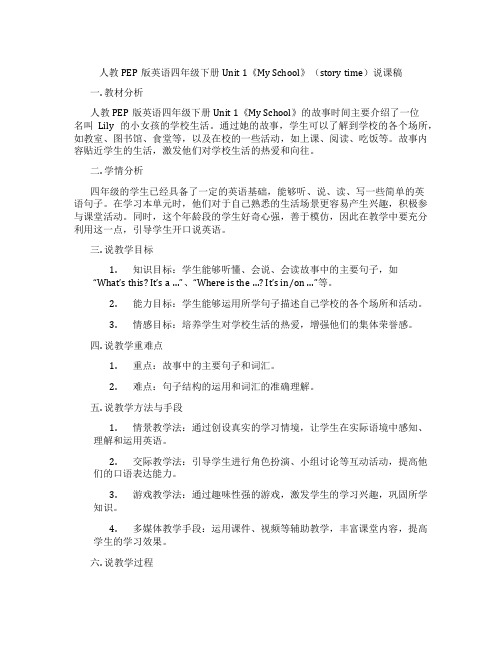
人教PEP版英语四年级下册Unit 1《My School》(story time)说课稿一. 教材分析人教PEP版英语四年级下册Unit 1《My School》的故事时间主要介绍了一位名叫Lily的小女孩的学校生活。
通过她的故事,学生可以了解到学校的各个场所,如教室、图书馆、食堂等,以及在校的一些活动,如上课、阅读、吃饭等。
故事内容贴近学生的生活,激发他们对学校生活的热爱和向往。
二. 学情分析四年级的学生已经具备了一定的英语基础,能够听、说、读、写一些简单的英语句子。
在学习本单元时,他们对于自己熟悉的生活场景更容易产生兴趣,积极参与课堂活动。
同时,这个年龄段的学生好奇心强,善于模仿,因此在教学中要充分利用这一点,引导学生开口说英语。
三. 说教学目标1.知识目标:学生能够听懂、会说、会读故事中的主要句子,如“What’s this? It’s a …”、“Where is the …? It’s in/on …”等。
2.能力目标:学生能够运用所学句子描述自己学校的各个场所和活动。
3.情感目标:培养学生对学校生活的热爱,增强他们的集体荣誉感。
四. 说教学重难点1.重点:故事中的主要句子和词汇。
2.难点:句子结构的运用和词汇的准确理解。
五. 说教学方法与手段1.情景教学法:通过创设真实的学习情境,让学生在实际语境中感知、理解和运用英语。
2.交际教学法:引导学生进行角色扮演、小组讨论等互动活动,提高他们的口语表达能力。
3.游戏教学法:通过趣味性强的游戏,激发学生的学习兴趣,巩固所学知识。
4.多媒体教学手段:运用课件、视频等辅助教学,丰富课堂内容,提高学生的学习效果。
六. 说教学过程1.热身(5分钟):引导学生唱一首关于学校的英文歌曲,激发他们的学习兴趣。
2.导入(10分钟):展示一幅学校的情景图,引导学生用中文描述图中的内容。
然后提问:“你们想不想知道Lily的学校生活是怎样的呢?”自然而然地引入新课。
- 1、下载文档前请自行甄别文档内容的完整性,平台不提供额外的编辑、内容补充、找答案等附加服务。
- 2、"仅部分预览"的文档,不可在线预览部分如存在完整性等问题,可反馈申请退款(可完整预览的文档不适用该条件!)。
- 3、如文档侵犯您的权益,请联系客服反馈,我们会尽快为您处理(人工客服工作时间:9:00-18:30)。
课题:Unit 1 Our school (一课时)
学习目标
(1)能够简单介绍学校校舍分布情况,如:This is the teacher’s office .That is my classroom .
(2)能简单说出每个课室的不同功能,如:Go to the library .Read a story-book
学习重难点
让学生熟练掌握“This is …That is …”的用法。
自主预习
1、听录音,读一读
playground teacher’s office garden
Library canteen
2、拼一拼,写一写
computer board fans light
This is my computer . That is your computer.
3、听录音,跟读课文,与小组内同学互相评读,看一看,比一比,谁读得好.
合作探究
1.我能流利朗读“Let’s talk”和“Read and write”的对话。
1) 自由读。
2)小组长或推荐优秀组员领读。
3)分角色表演对话。
4) 其他方式。
2.我会根据Let’s play中图示,设计对话,进行练习。
课堂检测
一、选择填空。
()1. fl A. our B. oor
()2. yo A. or B. ur
()3.pl se A. ee B.ea
()4.lun A. sh B.ch
()5.c teen A. en B.an
二、根据汉意写出下列单词
写字板-- 电脑-- 讲桌-- 灯--
图画-- 电扇-- 地板-- 墙--
三、短语搭配
( )1.Go to the teacher’s office. A.Water the flowers.
( )2. Go to the canteen. B. Eat some noodles.
( )3. Go to the library. C.Play football.
( )4. Go to the playground. D.Read a story-book.
( )5. Go to the garden. E.Hand in the homework.
学后反思
课题:Unit 1 Our school (二课时)
学习目标
1、能听懂并回答一些问题,如:Is this the library ? Is that the TV room ?
2、this和that的发音以及在楼层的表达中序数词first, second的用法。
学习重难点
掌握四个单词以及两个重点句子:“This is my computer. That is your computer.”的正
确书写。
自主预习
1、听录音,读一读。
Art room computer room washroom
music room gym TV room
2、拼一拼,写一写
Teacher’s desk picture floor wall
Is this teacher’s desk? Yes,it is.
3、听录音,跟读课文,与小组内同学互相评读,看一看,比一比,谁读得好.
合作探究
1.我能流利朗读“Let’s talk”和“Read and write”的对话。
1) 自由读。
2)小组长或推荐优秀组员领读。
3)分角色表演对话。
4) 其他方式。
2.我会根据Let’s play中图示,设计对话,进行练习。
课堂检测
一、选择填空。
()1.w l A. al B. ol
()2. f n A. e B. a
()3. b d A. oar B. ear
()4. l t A.aug B. igh
()5. c teen A. en B.an
二、根据汉意写出下列单词
绘画室-- 电脑室-- 卫生间--
音乐室-- 体育馆—电视室--
三、上下文搭配
( )1.Where is the gym?
( )2.Is this the playground?
( )3.Do you have a library?
( )4.How many desks are there in your classroom?
( )5.Look! This is our garden.
A.Oh. It’s beautiful.
B.Yes, I do.
C.It’s on the first floor.
D.No, it isn’t.
E.There are forty-four.
学后反思
课题:Unit 1 Our school (三课时)
学习目标
1、通过对Story time的学习,铺垫新句型:Is this the …? Is that the …?
2、会唱歌曲“Our school”.
学习重难点
总结元音字母a的发音规则。
自主预习
1、听录音,读一读。
a cake snake grapes face
apple bag cat hat
2、听录音,学歌曲,比一比谁唱的好。
3、听录音,跟读故事,与小组内同学互相评读,看一看,比一比,谁读得好.
合作探究
1.我能流利朗读“Good to know”和“ Story time”的对话。
1) 自由读。
2)小组长或推荐优秀组员领读。
3)分角色表演对话。
4) 其他方式。
2.我会介绍我的学校。
课堂检测
一、选择正确答案(15分)
( )1.Is this the washroom? _______
A.Yes, it is.
B.No, it is.
C.No, it isn’t.
( )2. The library is on the ______ floor.
A.one
B.two
C.second
( )3.Let’s go and _______
A.have look
B.have a look
C.look at
( )4. Do you have lunch ____ school?
A.in
B.at
C.on
( )5. How many ______ are there in your school?
A.student
B.students
C.students
( )6._____ way, please.
A. This
B.That
C. This is
( )7.Welcome _____ our school!
A.on
B.in
C.to
( )8.We draw pictures in the _____
A.music room
B.art room
C.canteen
( )9.We can read books in the ______.
A.library
room
C.gym
( )10.This is my desk. That is ______ desk.
A.your
B.you
C.I
二、抄写单词及句子,并写出它的汉语意思.
playground light classroom
( ) ( ) ( )
gym computer library
( ) ( ) ( ) This is my computer.
( )
学后反思。
